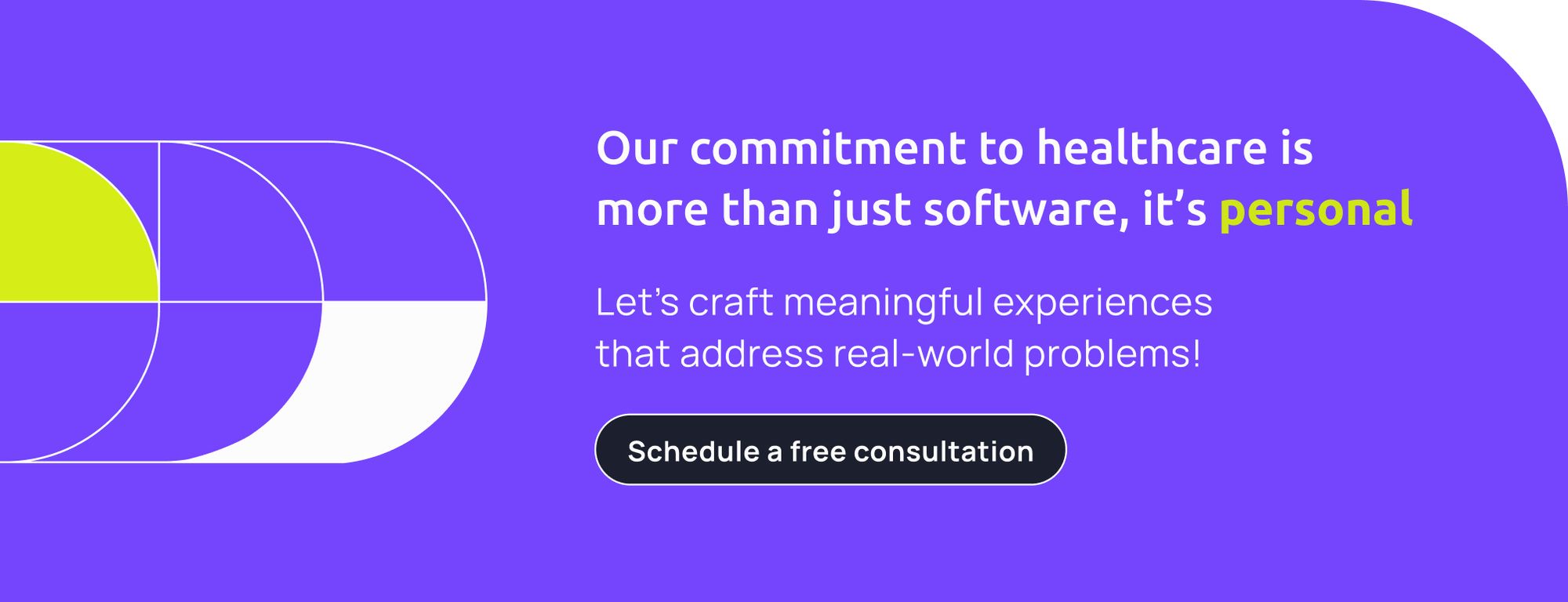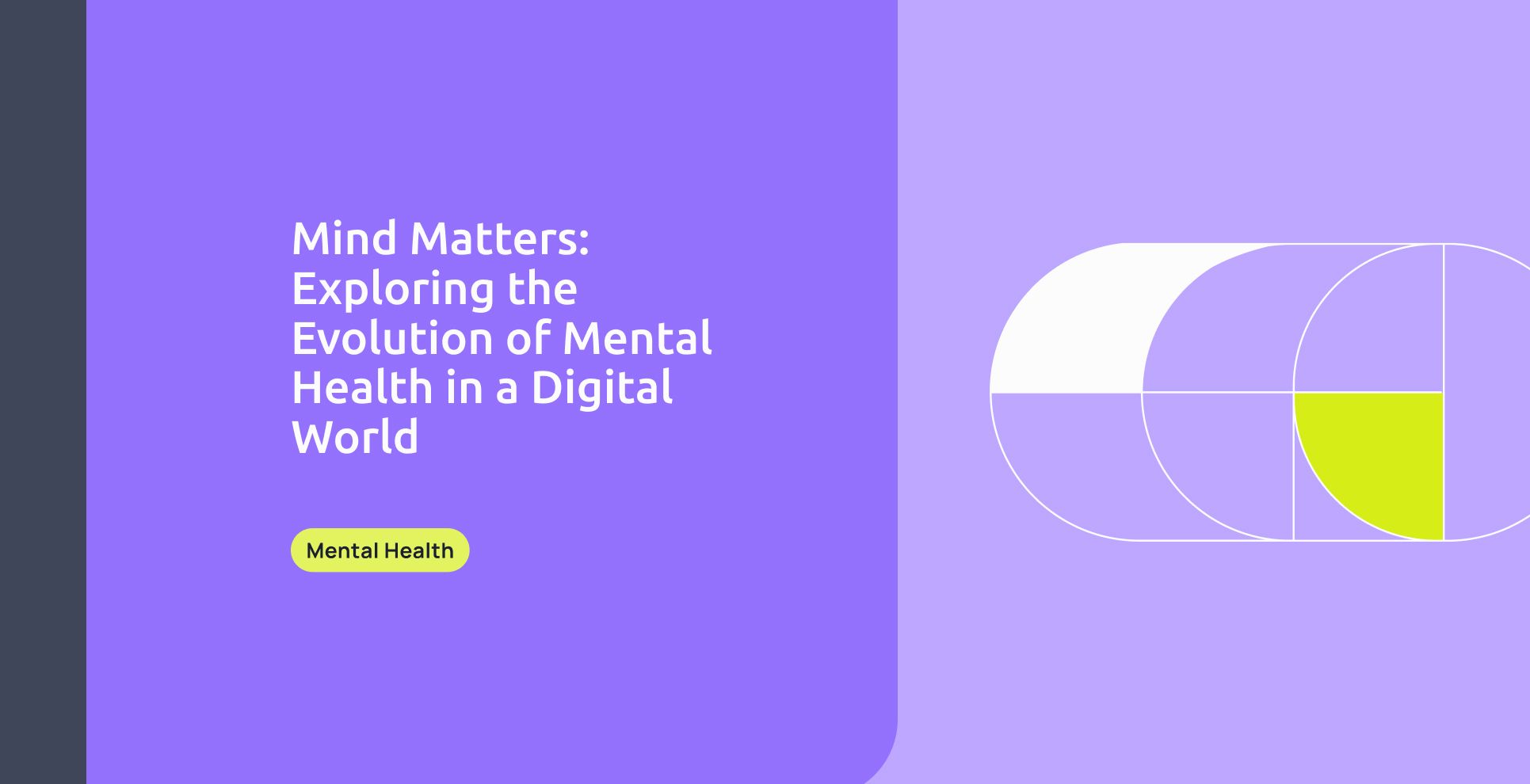Scientific research has proven that mental health significantly impacts a person's overall well-being, it can often be more influential than any other factor. Mental well-being is closely linked to physical health, affecting conditions like cardiovascular diseases and diabetes, only to name a few. Chronic stress, stemming from poor mental health, weakens the immune system, making the body more susceptible to illnesses. Additionally, mental health is crucial in adopting and maintaining healthy habits such as regular exercise and balanced nutrition.
The importance of mental health in today's fast-paced environment cannot be overstated. The relationship between technology and mental health is getting more complex as we go towards a time where technology rules the day. We will go further into the topic of mental health in this blog post, looking at how the conversation has evolved over time and how technology has shaped our perception and treatment of mental health problems.

Even though technology has numerous negative effects on mental health, it also offers a promising spectrum of opportunities and tools. We will also explore various applications and case studies. The aim is to demonstrate how technology plays a key role in transforming the mental health field, from reducing stigma through online platforms to enhancing accessibility to mental health resources in remote regions or lower socioeconomic levels.
Stats on technology’s impact on mental health
Research, has shown the alarming state of youth and the general population in mental health, concluding that one of the main factors of this affection is the rising use of social media and the internet as a whole.
- Depression and anxiety rates rose 70% over the last 25 years; nearly 1 in 10 reported depression. (Pew Research Center)
- An estimated 4.1 million US adolescents 12 -17 years old had at least one major depressive episode in their life. (Consumer Notice Organization)
- Psychologists estimate that as many as 5 - 10% of Americans meet the criteria for social media addiction. (Science Direct, Phil Longstreet; Stoney Brooks)
- Suicide is the second-leading cause of death for ages 10-24. (Youth.Gov Suicide Prevention).
- 3 in 10 adults in the US have reported symptoms consistent with depression or anxiety disorder since April 2020. (The Henry J. Kaiser Family Foundation)
After presenting the previous stats, it may sound contradictory to say that technology positively impacts our mental health. Many of you may constantly be hearing about its negative effects. But even though there are challenges, there are benefits when technology, AI, and other innovations are used purposefully. So, let's show this with numbers:
- 29% of psychologists are seeing more patients overall since the COVID-19 pandemic, and 96% said they’re treating patients remotely (American Psychological Association).
- 53% of clients who received online counseling reported that their depression became less intense. (Bradley University)
- 90% of digital mental health product users reported increased treatment adherence, confidence, motivation, and attitudes about their emotional health. (Buckeye Recovery Network)
- Technology services are often the first or only service someone has used for mental health support. Crisis Text Line provides free, 24/7 counseling and said that less than 45% of users had spoken to anyone else for crisis intervention. (US National Academy of Medicine)
Technology's promise for improving mental health
- Increased Accessibility: Technology allows individuals to access mental health resources and support services from anywhere, breaking down geographical barriers and ensuring help is available even in remote areas.
- Convenience and Flexibility: Telehealth platforms and mental health apps offer flexible scheduling, enabling individuals to attend therapy sessions or engage in self-help activities at their own convenience, fitting around their busy lifestyles.
- 24/7 Support: Online platforms and apps provide round-the-clock support, allowing individuals to reach out for help or access coping tools whenever needed, reducing the feeling of isolation and providing a sense of security.
- Anonymity and Privacy: Technology enables users to seek support anonymously, which can be particularly helpful for those who feel uncomfortable discussing their mental health concerns face-to-face. Online platforms provide a safe space to share thoughts and feelings.
- Cost-Effectiveness: Digital mental health solutions can be more affordable than traditional in-person therapy, making mental health support more accessible to more people.
- Personalized Interventions: Technology allows for the development of personalized mental health interventions based on individual needs and preferences, ensuring that the support provided is tailored to each person's specific requirements.
- Data Tracking and Monitoring: Mental health apps can track users' progress, providing valuable data to individuals and healthcare professionals. This data can inform treatment plans and help individuals understand their emotional patterns better.
- Reduced Stigma: Online platforms and apps reduce the stigma associated with mental health. Technology encourages open discussions about mental well-being by making mental health resources readily available and widely accepted.
Telehealth and behavioral health
Health services provided through interactive, synchronous, or asynchronous audio and visual telecommunication systems are called telehealth.
Applications and formats are diverse: one-on-one, therapy group, therapy text, therapy addiction counseling, medication prescribing, medication-assisted treatment for substance use disorders, medication monitoring, mental health screening, and anxiety and depression monitoring, among many more!
According to a peer-reviewed paper from the National Library of Medicine, telehealth use in the US skyrocketed during the early stages of the COVID-19 pandemic. The use of telemedicine for mental health issues during this period considerably outpaced that for general physical health issues.
Telehealth in mental health offers practical advantages that have transformed how individuals receive care. One of its main benefits is enhanced accessibility, allowing people to connect with mental health professionals remotely and removing obstacles such as travel and distance. This ease of access ensures regular and timely sessions, promoting consistent care. Telehealth also prioritizes privacy, enabling patients to discuss sensitive topics openly and securely. Additionally, it improves the efficiency of mental health services by reducing wait times and offering flexible scheduling, allowing for swift intervention and support. Moreover, it empowers patients to engage in their treatment and access resources online actively. Overall, telehealth eliminates traditional barriers, making mental health support more practical and accessible to a broader audience.
Generative AI Mental Health Digital Products
AI can positively impact this global mental health pandemic. Yes, it's a global pandemic.
Generative AI, with its ability to create data and simulate human-like interactions, has beneficial applications in mental health.
Some applications include:
- Virtual Therapy and Counseling: Generative AI-powered chatbots and virtual agents can provide therapy and counseling services, offering immediate support to individuals experiencing mental health issues. AI-driven chatbots offer 24/7 support, allowing individuals to express their feelings, receive encouragement, and access helpful resources, reducing feelings of isolation.
- Emotion Recognition: Generative AI can analyze facial expressions and voice tones to recognize emotions, diagnose mood disorders, and provide personalized interventions.
- Content Creation for Cognitive Behavioral Therapy (CBT): Generative AI can generate tailored content for CBT exercises, helping patients practice coping strategies and manage their emotions effectively.
- Personalized Treatment Plans: By analyzing extensive amounts of patient data, generative AI can assist in creating customized treatment plans, optimizing medication dosages, and suggesting therapy techniques tailored to individual needs.
- Early Detection of Mental Health Issues and Dangers: Generative AI algorithms can analyze social media posts, online behavior, or speech patterns to identify early signs of mental health problems, enabling timely intervention and support. It can even help in preventing suicide by identifying concerning patterns in online communication and social media posts, allowing for timely intervention, and providing support to individuals in crisis.
- Therapeutic Gamification: Generative AI can create interactive and therapeutic games designed to help individuals manage stress, anxiety, or phobias, providing a unique and engaging form of therapy.
- Natural Language Processing (NLP) in Psychotherapy: NLP algorithms can assist therapists by analyzing session transcripts, helping them understand patient concerns, track progress, and tailor therapeutic approaches more effectively.
These applications showcase the potential of generative AI in revolutionizing mental health care, offering innovative solutions to enhance diagnosis, treatment, and support for individuals facing mental health challenges.
Breaking Boundaries and Building Bridges: Case Studies from Light-it
At Light-it, we're proud to say we're collaborating in creating a world where everyone feels heard, supported, and understood. Our team's expertise has allowed us to develop solutions that positively impact patients suffering from mental health disorders.

Here are some of the projects we’ve worked on:
Zebra Telehealth, connects board-certified healthcare providers with students at schools. We worked on a program oriented to educational institutions, allowing them to provide safe mental health services to a nationwide US program.
Composure is the company behind Sound Blanket Hub, a digital platform to improve the well-being of senior living communities by reproducing calm-inducing and sound-masking sounds that help cue bedtime, fall asleep faster, and get better sleep all night.
Therapy Lab is a mental health practice that offers custom-made therapy plans for common life problems for adults and children.
Seven Starling is a virtual mental health platform that supports women through every stage of motherhood, from fertility challenges, pregnancy, pregnancy loss and miscarriage, abortion, postpartum, and early parenthood.
A perfectly balanced mix: Technology, Human caregivers, and Patient’s Close Circle
Achieving the ideal balance between human caregivers and technology in mental health is essential. Technology enhances accessibility and efficiency, reaching a wider audience, while human caregivers provide empathy, personalized understanding, and super-specific clinical knowledge. It's equally vital to involve patients' inner circle and support system in the treatment. Including family and friends fosters a supportive environment, aiding the healing process and enhancing treatment adherence. Integrating these elements ensures comprehensive mental health support, addressing emotional needs and symptoms.
____
Mental health enthusiasts: Behavioral Health Tech Conference is about to take place!
Come meet us in Phoenix at the largest event dedicated to advancing mental health through technology.
____
Final insights
In understanding mental health and technology, it's clear that tech has significantly transformed how we approach mental well-being. Virtual therapies, AI interventions, and human support systems have made mental health care more accessible. Moving ahead, it's crucial to recognize the combined strength of technology and human understanding. This practical approach ensures effective and compassionate mental health support. Combining technology, human empathy, scientific knowledge, and a strong support network is the path to a new era in the field of mental health.


